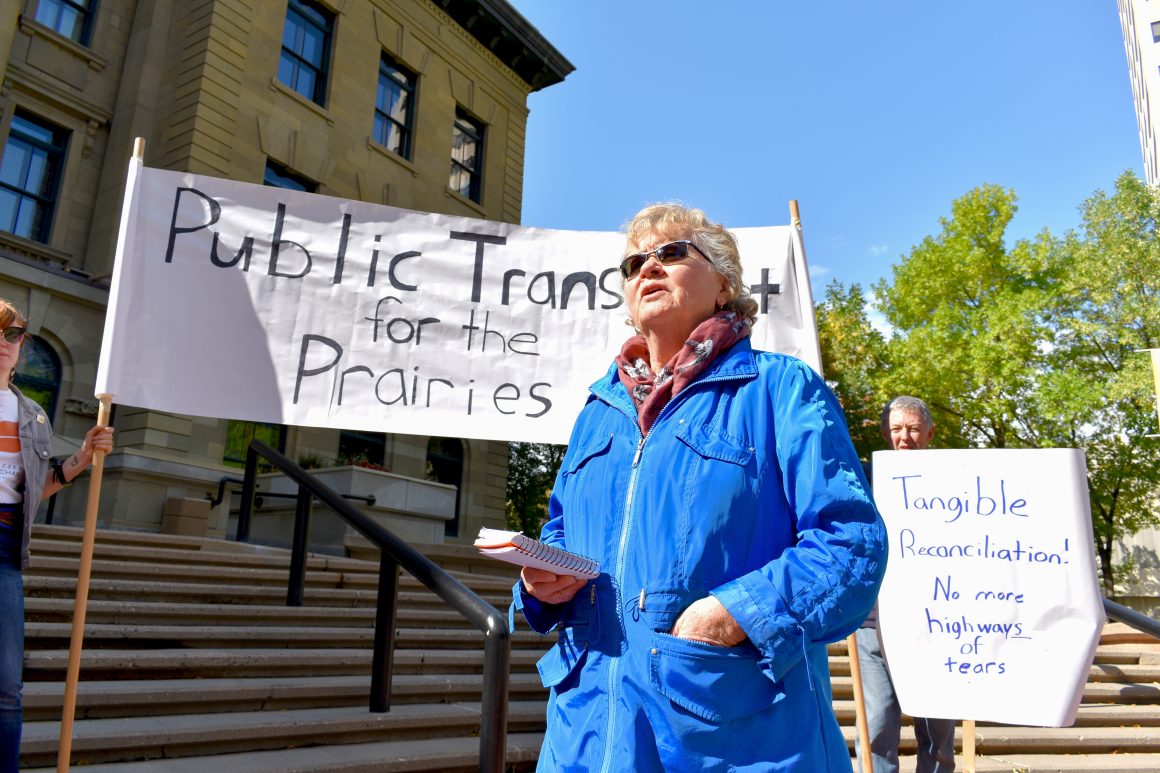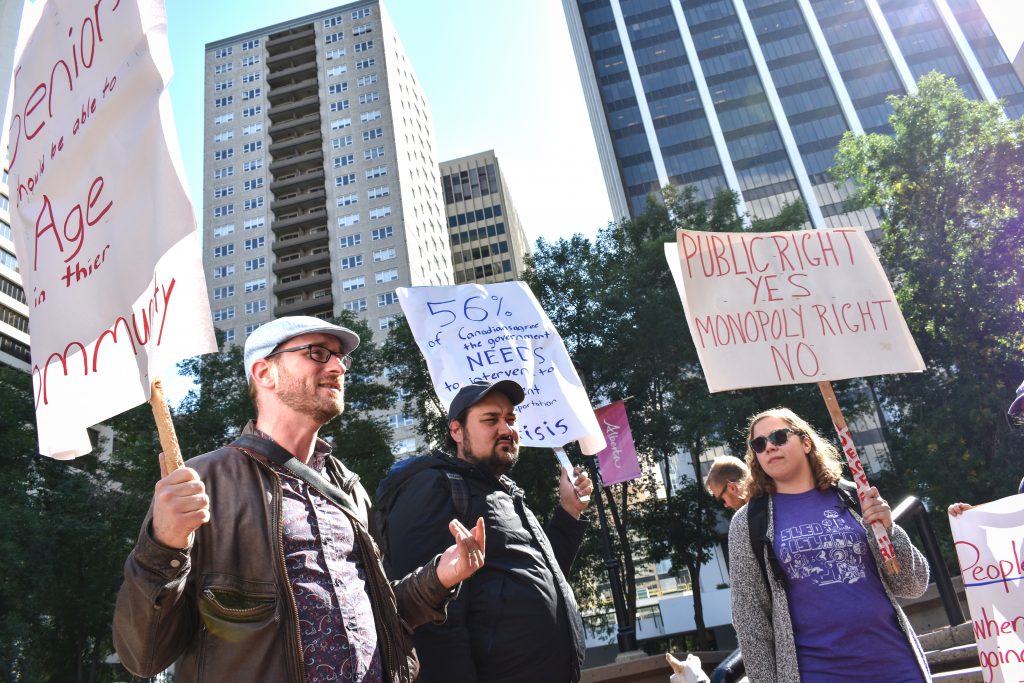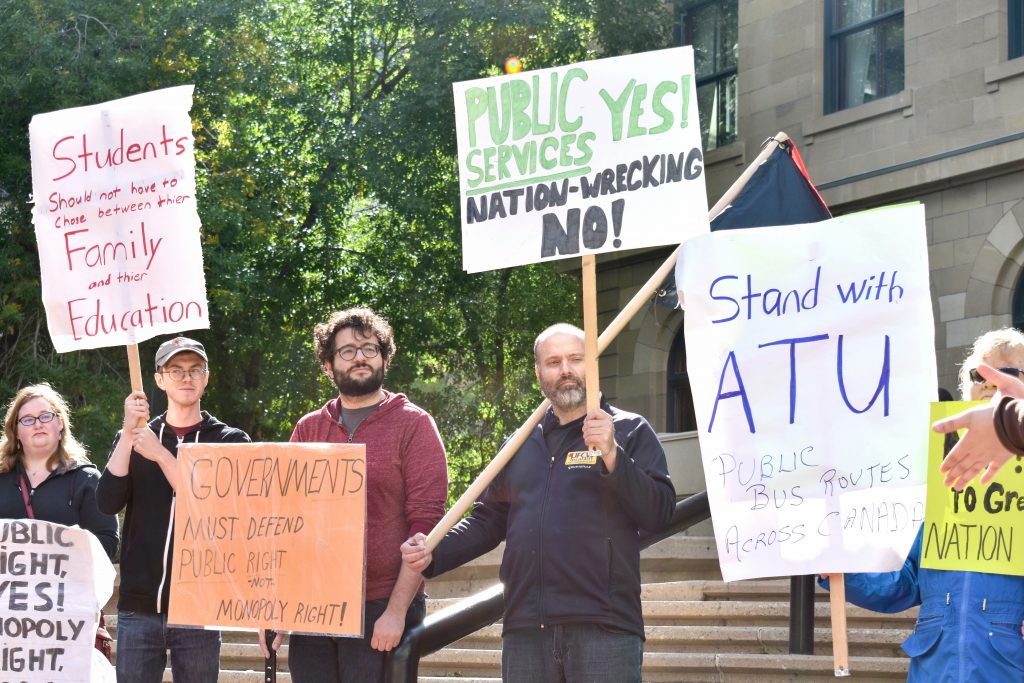
Grassroots advocacy group rallies for public transportation in the prairies
By Matty Hume, September 10 2018 —
Approximately a dozen protesters gathered in front of Calgary’s McDougall Centre, the city’s provincial government office, on Labour Day to call for provincial action in developing a publically-funded alternative to affordable transportation. This comes following Greyhound Canada’s announcement that they will end all routes in Western Canada, effective Oct. 31. Nationalize Bus Routes, the small grassroots advocacy group that hosted the rally, simultaneously hosted a similar rally in Winnipeg.
“It’s not just us. There are people all across Western Canada that are upset about this and need something to happen,” said Nicole Montford, the volunteer organizer for Nationalize Bus Routes in Calgary. “It’s used by so many people — so many people rely on it. It’s what connects our communities together. It’s very, very important that people can travel and for Greyhound to just do this, to completely drop the ball, I think really exposes how the free market is not going to solve this. We need to come together and we need to put a public solution to the forefront.”

Protesters hoisted signage condemning Greyhound and underlining the significance of affordable inter-community transit in the western provinces, highlighting student, senior and Indigenous communities. Following a speech by Montford outlining the purpose of the rally, participants took part in a dialogue to share their experiences with Greyhound and discuss public alternatives.
“I have been using Greyhound since I moved to Calgary in 1975, constantly going back and forth across the province and more recently, using it to go back and forth from Vancouver,” said Peg Askin, a senior rally participant. “And on those buses that are filled with youth, retirees, very poor people, students — they are people travelling from one end of the country to the other. And they’re not just going on the most popular routes that private companies are starting up.”
Askin also said that as a British company, Greyhound has “no stake in our communities, no stake in the lives of the people affected by this and the only stake they have is in our economy.”
Acknowledging the difference between companies such as Red Arrow, maintaining profitable routes between large cities and the need for access to rural communities were common themes in the rally’s discussions.
“We’re asking for this not just for ourselves, we’re asking for this for students. They should not have to choose between their education and visiting their families. We are asking for this for seniors who rely on services and care that are only found in city centres that they can’t access in their small rural communities,” Montford said. “They have just as much a right as anybody to those services and if there’s no transportation to get them there, they’re not going to be able to age in their own communities.
“We’re asking for our Indigenous communities as well,” she continued. “The Highway of Tears is real and one of the main messages that we have gotten from the Inquiry Into Missing and Murdered Indigenous Women is there needs to be safe, affordable and reliable transportation. Their lives matter and that would be a tangible form of reconciliation.”

During an open dialogue, protesters discussed various ways to make a public transportation option possible, as well as the next steps for Nationalize Bus Routes’s advocacy efforts.
According to Montford, Nationalize Bus Routes intends to hand out leaflets at various Greyhound stations to garner interest in the service’s existing users, contact other social rights activist groups and press for discussions with rural Members of the Legislative Assembly whose communities will not have affordable transportation alternatives following Greyhound’s closure.
“We are asking for all Canadians who just want to be connected, who want their communities to be connected together instead of shrinking our lives and shrinking ourselves into small insular communities. We want to be connected,” said Montford. “We have a greater community here in the prairies. It’s not just about Calgary, it’s not just about Edmonton, it’s about all cities in Western Canada.”
